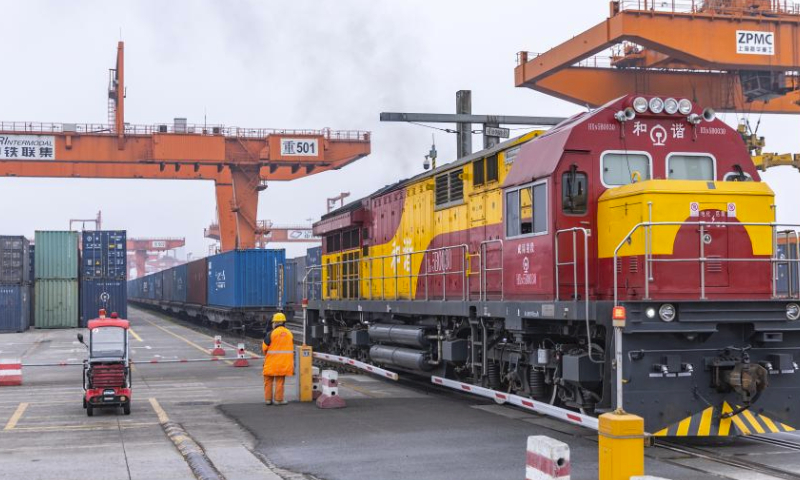
A China-Europe freight train loaded with machinery, automobiles and auto parts waits for departure at a railway station in Chongqing, southwest China, March 7, 2024. Benefiting from the increase of train trips and the launch of new freight train routes, including two direct rail routes to Spain and Türkiye, the city of Chongqing has seen increase in its export via China-Europe freight train service this year. Photo: Xinhua
As China’s top leader is visiting France, Serbia and Hungary this week, the China-Europe freight train services, a direct reflection of economic and trade ties, have reported significant business growth. Industry insiders said on Tuesday that the train services mirror the need to strengthen and deepen bilateral cooperation, not competition, between China and Europe.
Since the beginning of this year, the intercontinental freight train services have seen robust development, driven by demand. Major transportation hubs from Manzhouli in North China’s Inner Mongolia Autonomous Region to Wuhan, Central China’s Hubei Province, all reported positive growth so far this year.
Meanwhile, high value-added goods such as the “new three” products – new-energy vehicles, lithium-ion batteries and photovoltaic products – have been an important part of the trade.
Compared with the same period last year, cargo volume has increased by about 10 percent this year, primarily driven by new and value-added products, Tommy Tan, president of Shanghai EPU Supply Chain Management Co, told the Global Times on Tuesday.
Efforts are focused on increasing the transportation capacity and improving service offerings, with the hope of providing more stable options for customers, Tan said.
Tan’s company has been operating China-Europe freight trains to multiple European cities, including Lyon in France and Budapest in Hungary. There has also been discussion about establishing services to Serbia, he said, expressing his optimism about the future demand for China-Europe freight trains in these regional countries.
From January 1 to May 5, the port of Manzhouli in the Inner Mongolia Autonomous Region, along with Suifenhe and Tongjiang in Northeast China’s Heilongjiang Province – the three major transportation hubs for China-Europe freight train services – have reported the delivery of 210,000 20-foot equivalent units (TEUs) and the dispatch of 2,000 trains, according to China Railway Harbin Bureau Group Co. This achievement occurred nine days earlier than last year, marking a historic record.
The train traffic at these three ports accounted for about one-third of the nation’s total.
There have been more trains dispatched between cities in China and Europe since the launch of the freight train services. For example, when Wuhan launched its first China-Europe freight train service to Lyon in April 2016, which marked the nation’s first international freight train service directly to France, there was only one train per week. Now there are one or two per day.
The rapid development of China-Europe freight trains reflects the increasing complementarity and expansion of trade, and economic cooperation between China and Europe, which is truly a demonstration of win-win results that serve the interests of all countries involved, Kang Shuchun, director of the China Federation of Logistics and Purchasing, told the Global Times on Tuesday.
The positive figures also show that China’s “new three” products have strong demand in Europe and are expected to become the main exports from China in the foreseeable future, Kang said.
Meanwhile, European agricultural and sideline products, high-tech products and artificial intelligence products are continuously entering the Chinese market, meeting the growing demand of the Chinese people for high-quality goods. The China-Europe freight trains play a “guarantee” role in facilitating these exchanges, said Kang.
In the middle of ongoing global challenges like the Red Sea crisis, cross-border freight train services are receiving widespread praise for their dependability, effectiveness and affordability.
Industry insiders said that since the Red Sea crisis began, there has been a noticeable uptick in the volume of imports and exports facilitated by the China-Europe freight trains. This surge is attributed to a growing number of international traders opting for rail transport due to disruptions in sea shipping.
In terms of efficiency, railways offer a clear advantage over maritime transport. Following a decade of substantial development, China-Europe freight trains now complete their journeys in approximately 12 days, a significant contrast to the typical sea transit time of 35 to 45 days.
As for cost, rail freight is comparable to sea transport, especially considering the diminishing price gap when rerouting via the longer Cape of Good Hope route.
The cross-border cargo train services have become an increasingly important stabilizer and catalyst of the global supply chain. What is behind the positive growth of the train services is the growing need for cooperation, not competition, between the East and the West, Wang Yiwei, a professor at the School of International Relations at Renmin University of China, told the Global Times on Tuesday, extending his expectations for stronger trade as both sides uphold mutual respect and win-win cooperation.
